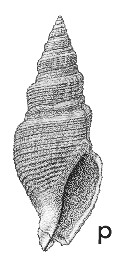
Revised descriptions of New Zealand Cenozoic Mollusca from Beu and Maxwell (1990)

 | Revised descriptions of New Zealand Cenozoic Mollusca from Beu and Maxwell (1990) | 
|
  (Pl. 15p): GS9806, F45/f9668, Shell Gully, Chatton, Duntroonian (GNS) |
Beu & Maxwell (1990): Chapter 10; p. 162; pl. 15 p.
Synonymy: Austrotoma inaequabilis Marwick 1929, p. 922
Classification: Turridae: Pseudotominae
Description: Size moderate for genus (height 30-40 mm), fusiform, spire 0.5-0.6 total height. Protoconch conical, of 3.5 whorls, initial whorl smooth, last whorl with spiral cords, last half with axial costellae. Teleoconch of 5-6 whorls, shouldered above middle on spire; sutural ramp strongly concave because of subsutural swelling; sides subvertical. Last whorl with well rounded periphery; whorl twisted anteriorly to form short neck. Axial sculpture commencing as narrow, low, rounded, opisthocline costae extending from shoulder angulation to lower suture, 16-18 per whorl, becoming obsolete on later whorls; numerous growth lines present over whole surface. Spiral sculpture of fine threads on ramp, 1 or 2 slightly stronger ones on subsutural swelling; more prominent but narrow cords below, 6-8 on penultimate whorl, and 10-12 additional cords on base and neck, some cords with interstitial threads. Finer spiral elements reticulated by growth lines, cords typically smooth and polished, only feebly crenulated. Aperture subrectangular; columella twisted anteriorly to form short, deeply notched siphonal canal. Fasciole prominent, ridge-margined. Inner lip thinly callused; outer lip thin, with a shallowly arcuate sinus on ramp, strongly convex below.
Comparison: Austrotoma inaequabilis is distinguished from other species by its relatively slender shape, its narrow axial costae that become obsolete on about the fourth whorl, and its narrow spiral cords. A. nervosa (Pl. 22k) is similar, but is larger, has axial costae disappearing at an earlier stage of growth, and has more prominent spiral cords, most of which are without interstitial threads. Numerous species of Austrotoma, many of them undescribed, are known and most require careful study before they can be identified confidently. The genus is very doubtfully recorded from the Wangaloan, and confidently from Whaingaroan to Waipipian, in inner shelf to outer shelf or upper bathyal facies. Similar species have also been recognised recently living off the Atlantic coast of southern Brazil and Argentina.
Distribution: Duntroonian, Chatton Formation, Shell Gully, Chatton (type) (uncommon).
Cite this publication as: "A.G. Beu and J.I. Raine (2009). Revised
descriptions of New Zealand Cenozoic Mollusca from Beu and Maxwell (1990). GNS
Science miscellaneous series no. 27."
© GNS Science, 2009
ISBN
978-0-478-19705-1
ISSN 1177-2441
(Included with a PDF facsimile file
copy of New Zealand Geological Survey Paleontological Bulletin 58 in CD version
from: Publications Officer, GNS Science, P.O. Box 30368 Lower Hutt, New
Zealand)